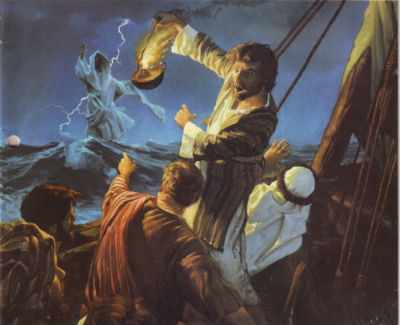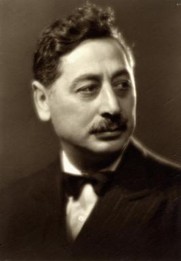 On occasion, even the disciples knew they were dealing with more than a man.
On occasion, even the disciples knew they were dealing with more than a man. On occasion, even the disciples knew they were dealing with more than a man.
On occasion, even the disciples knew they were dealing with more than a man.What if God, in order to rescue his creation from itself, knew in advance he had to become one with them? What if, to effect his plan to bring many children to glory (Hebrews 2:10) he knew only too well that the one great hope that darkened, alienated, guilty human beings would have of responding to him meant his coming in their guise and drawing alongside them as a man, an ordinary man.
What if?
What if, that is, the story Christians invest in so heavily known as the Bethlehem Story were true? Not only true but necessary. That’s the sort of radical agenda behind such Bible passages as these:
“Since the children have flesh and blood he too shared in their humanity so that by his death he might destroy him who holds the power of death – that is, the devil – and free those who all their lives were held in slavery by their fear of death” (Hebrews 3:14-15).
There’s a lot of meaning packed into these verses which show us the theological engineering (to coin a phrase) behind what we know as Christmas. These thoughts give us a God’s-eye-view of what God was about in what Christian teachers call the incarnation, the meeting of heaven and earth, the eternal Word becoming flesh and dwelling among us (John 1:14).
Christian thinkers down through time have boldly set out what was at stake in all this, in the transformation of the eternal living Word who existed from the beginning with the Father into the flesh and blood person history knows as Jesus Christ, a Jew from Nazareth.
Philip Yancey the Christian journalist puts it in a wry way in his book The Jesus I Never Knew. He draws an analogy from feeding and managing his goldfish. “You would think, in view of all the energy I expended on their behalf, that my fish would at least be grateful. Not so. Every time my shadow loomed above the tank they dove for cover to the nearest shell…I could not convince them of my true concern” (page 38).
Yancey concluded semi-humorously: To really reach then I would have to become a fish.
 External history documents Jesus Christ.
External history documents Jesus Christ.Here’s the way the Scottish theologian Thomas Torrance explained it.
“The New Testament is at pains to make clear the full humanity of Christ. He comes as bone of our bone, and flesh of our flesh; he speaks with a human voice, is brought up in a human family, eats, drinks, thirsts and is hungry, grows weary, and is pained, rejoices and sheds tears, and is encompassed with our frailty and infirmity.
“Here in Jesus the eternal God comes so near that he is a particular man (a carpenter’s son from Galilee), such a man in fact that people could easily pass by him as just another man, and easily fail to see anything else in him than ordinary humanity.”
Jesus? Ordinary? Yes. When he visited his hometown in Nazareth they rebuffed him. “Who does he think he is? Why this is the carpenter’s son? We know his family? Who is he to put on airs?”
That’s in Mark 6:1-3. The Gospel accounts are very honest – almost painfully so. Jesus appeared so ordinary that he slipped past those who tried to harm him on more than one occasion. About 1000 AD a man wrote a treatise about all this strangeness. He called it “Why the God-man?” Yes, as long ago as a thousand years Christian thinkers were still digesting the implications of the incarnation, the Bethlehem story we observe every year at Christmas.
Jesus wept. He grew tired. He needed his friends around him. But on the other hand he raised the dead, he healed the sick, he stopped funerals and aroused a corpse. He stilled a raging storm with a word of command and walked on the water as if it were pavement. The demons feared and shrank from him. The arresting officers had never heard anyone speak like him. Yet he died as a man dies, seemingly, bleeding and gasping for air but…to those with eyes to see, he was the son of God. When Jesus prayed for his enemies forgiveness as they drove nails through his hands and feet, when he calmed the panicky request of a fellow-victim, when he took care to arrange for his mother’s safety while on the cross, when his clear mind refused the drug that was offered, a Roman officer – a man who had seen death many times – declared simply, “Surely this was the son of God.”
Jesus out and out stated in his ministry that he had the power to forgive sins (Mark 2:1-12). His bitter enemies were right – only God could do that!! Beyond that he had authority to welcome us into that intimate relationship with the Father that he always said he had. Years later, one of his followers put it this way: “To all who received him – he gave the right to become children of God” (John 1:12).
And that was why he came. To lift us up to the Godhead by humbling himself to death. By dying the death of us all and yet by coming back out the other side – the Destroyer of Death, the Savior of all. That’s the extended miracle, that’s the beauty of it, that’s what Satan perhaps never saw coming. He never saw the full divinity in Jesus till it was too late. Even some of Jesus’ own disciples felt he was, well, a prophet (Luke 24:19). Yea. A prophet and more than a prophet. That’s why we need to hear what some of the most distinguished students of the incarnate Jesus had to say. It makes up an amazing testimony.
Torrance adds this: “If Jesus Christ was not man as well as God that would mean that God had not actually come all the way to man, that he had not really got a foothold in our creaturely world, as it were, within the time series in which we are. It would mean that God was still far away from us, as far as the heaven is from the earth.
“If Christ is not man, then God has not reached us, but has stopped short of our humanity…has stopped short of coming all the way to where we are and becoming one of us in order to save us.”
One of us. Jesus as the Pattern, the Forerunner (Hebrews 6:20) showed how God cleanses us from within…through the life-giving Spirit. By so doing God recreated humanity through the perfect obedience of the Son, the man who lived a holy and sinless life even with our old Adam entrenched within him. The whole thing is wondrous in its simplicity: God has actually come among mankind to conquer sin in the flesh. He has revealed himself to us in order to reconcile men and women to himself and lift us up to the Father. In his flesh and blood and bone, Jesus fulfills Isaiah’s prophecy, Immanuel, God with us.
But there is still more. The German Enlightenment philosopher Goethe (1749-1832) stated flatly: “If ever the divine appeared on earth it was the person of Christ.”
The English thinker John Stuart Mill (1806-1873) focused a most brilliant question. “But who among His disciples,” asked Mill, “was capable of inventing the sayings ascribed to Jesus, or imagining the life and character revealed in the Gospels?” One writer added: “If Jesus did not exist we could not have invented him.”
The church historian Philip Schaff took off on Mill’s point: “Who could imagine such a character of fiction as this: who always returned the wisest answer to tricky questions (“Go and do likewise” to a smart-aleck lawyer)…
…who taught the sublimest truth in the crispest language (“Render to Caesar the things that are Caesar’s and to God the things that are God’s”)…
…who revealed the deepest knowledge of human nature without turning cynical (“Most assuredly, I say to you, one of you shall betray me”)…
…who never lost possession of Himself under the cruelest pain (“Father, forgive them, for they know not what they do”)…
…who calmly and deliberately predicted his own death and stayed around for the arrest (“leave Mary alone; she has done this [anointing with perfume] for the day of my burying”)…
…who meekly and matter-of-factly assumed equality with the Godhead: “I lay down my life…no one takes it from me but I lay it down of my own accord. I have authority to lay it down and take it up again. This command I received from my Father” (John 10:18).
Oh, that we all had such calm assurance.
C.S. Lewis put it nicely: “It would take more than a Jesus to invent a Jesus. The Cause is always greater than the Effect.”
Lewis went on to fashion a dialectical quandary for the skeptics: “If Jesus was not God, teaching and example and the megalomania which lay behind it unless he was God has never been satisfactorily explained…If he were not God, He could only be a fool, for he died for his teaching with no hope of redemption, for he hatched the cruelest hoax in history.”
He was, says Lewis, either the Lord of all, or He was a liar, or He was a lunatic. Lunatic? Yes. For no sane TV preacher today would follow someone who made the claims Jesus Christ made – “Whoever eats my flesh and drinks my blood, has eternal life…He who eats me shall live of me.”
That covers a lot of ground. Josh MacDowell says, “If Jesus were not God he deserved an Oscar.”
Years ago a devout Christian wrote this summary:
“Here is a man who was born in an obscure village of a working class woman. He grew up in another village; he worked in a carpenter shop and then at age 30 began a career as an itinerant preacher. He never wrote a book, he never had a family, as far as we know he never went to college and had any great connections or travelled more than 200 miles from home…and yet…and yet we have no other Teacher who so completely eliminated the trivial, the false from his teaching, who selected only the eternal and the universal and combined them in a teaching where all great truths find a congenial home.”
 Sholem Asch
Sholem AschThe Jewish scholar Sholem Asch in The Encyclopedia of Religious Quotations noted; “Jesus Christ is the outstanding personality of all time…No other teacher, Jewish, Christian, Buddhist, Mohammedan is still a teacher whose teaching is a guidepost for the world we live in…Other teachers may have something basic for an Oriental, an Arab or a Westerner, but every act and word of Jesus has value for all of us. Why shouldn’t I, as a Jew, be proud of that?“
The historian Philip Schaff added: “Rejected by the Establishment, abandoned by his friends, left stripped naked in full public view, he is today the most well-known figure in history. Herod could not destroy him, the grave could not hold him and his friends could not discourage him and the mighty Roman Empire could not suppress his story. The sages and heroes of history are receding from us, and history shrinks the records of their deeds into a narrower and narrower page. But time has no power over the deeds and words of Jesus Christ.”
So far Jesus has been right: Heaven and earth shall pass away, He said, “but my words shall not.” How could he know this?
The apostle Paul summarized what Christians see at work in the babe of Bethlehem: “In Him dwells all the fullness of the Godhead in bodily form” (Colossians 2:9).
Jesus Christ – still beyond our ken; confounding our measuring devices; escaping the depictions of our talented artists, novelists, script writers and producers. And he disturbs our consciences still, which if God became a man is exactly what we would expect. Perhaps Thomas’ reaction is the only fitting response when, falling to our knees, we say: “My Lord and my God.”